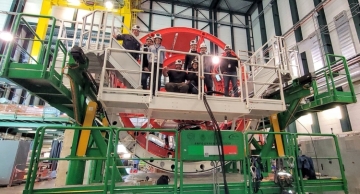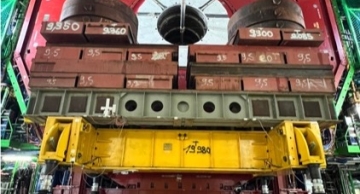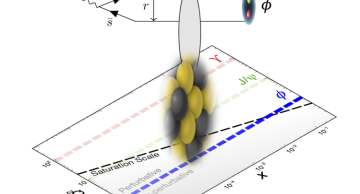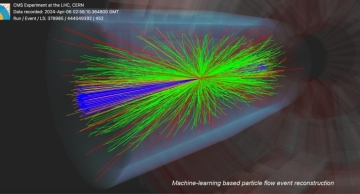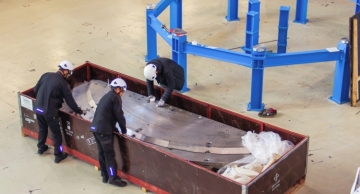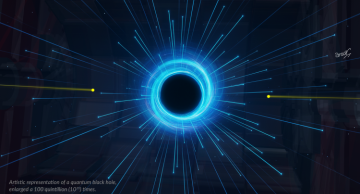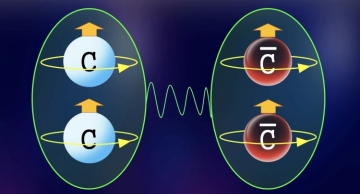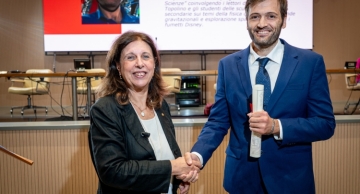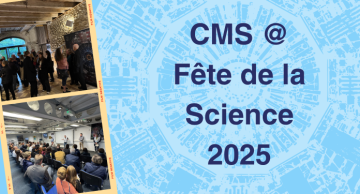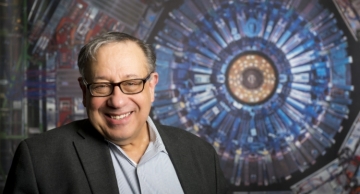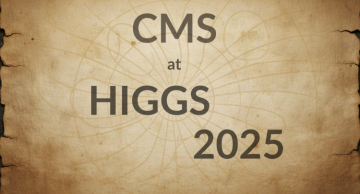The Electromagnetic Calorimeter (ECAL) group has tested the second enfourneur (pictured above), a highly specialized instrument that allows the insertion and extraction of key components of the CMS detector at CERN, the ECAL ‘supermodules’.
Weighing…
News
|
sohurst |
Detector
|
sohurst |
Detector
CMS successfully carried out key tests for the lifting system needed in the construction of Hi Lumi CMS during the end of year stop 2025/2026.
Four thin legs emerge from the floor of the CMS cavern to lift incredibly heavy parts of the CMS detector…
|
adelanno |
Physics
The CMS Collaboration reports the first measurement of coherent ϕ meson photoproduction, establishing a powerful new tool to explore the dense nuclear matter in the transition regime from perturbative to nonperturbative QCD.
The CMS Collaboration…
|
sohurst |
Collaboration
Anadi Canepa has been elected the new CMS Spokesperson 2026 - 2028. Florencia Canelli will join Hafeez Hoorani as Deputy Spokesperson.
With more than 6000 scientists, engineers, technicians, administrators and students, CMS is one of the world…
|
maiqbal |
Physics
An interactive version of the above event display can be found at this page.
For the first time, the CMS experiment has demonstrated that machine learning can be used to reconstruct collisions at the LHC. This new approach improves the precision…
|
nstathak |
Detector
After an eight-week journey, the first HGCAL absorber structure (CE-H1) was delivered to CERN and is ready to be assembled, just 100 metres above where the detector will eventually be located.
Seventeen enormous boxes were delivered at the CMS…
|
maiqbal |
Physics
The CMS experiment utilises cutting-edge machine learning techniques to search for microscopic, quantum black holes and other exotic objects that evaporate in an instant.
Black holes are amongst the most fascinating objects in the universe.…
|
adelanno |
Physics
Upon close inspection, the tetraquark family members are consistent with tightly bound diquark pairs
The CMS Collaboration has identified three extremely rare same-flavor teraquark states and determined, based on their spin-parity configuration,…
|
sohurst |
Engage with CMS
Luigi Marchese wins the prestigious SIF 2025 award for Science Communication, recognising his work on disseminating physics through comic books from the Societa’ Italiana di Fisica “Italian Physics Society”, or SIF.
LUIGI MARCHESE, ETH Zürich e…
|
nstathak |
Engage with CMS
“I can’t believe such an amazing experiment is right on our doorstep!”
“Wow!”
“Thanks so much for sharing this with us!”
These are some of the quotes from around 50 residents of the Pays de Gex, mostly from Cessy, who came to a special evening visit…
|
nstathak |
Collaboration
Joel Butler, former CMS Spokesperson (2016-18), has been awarded with the APS 2026 Panofsky Prize in Experimental Particle Physics.
The prestigious prize was announced this morning by the American Physical Society (APS).
For wide-ranging scientific…
|
maiqbal |
Physics
The CMS experiment announces new results for the Higgs 2025 conference.
For the Higgs 2025 conference, CMS publishes a number of new results.
The LHC Run 2 Legacy on Higgs boson pair production is obtained in an ATLAS+CMS combination (HIG-25-…

